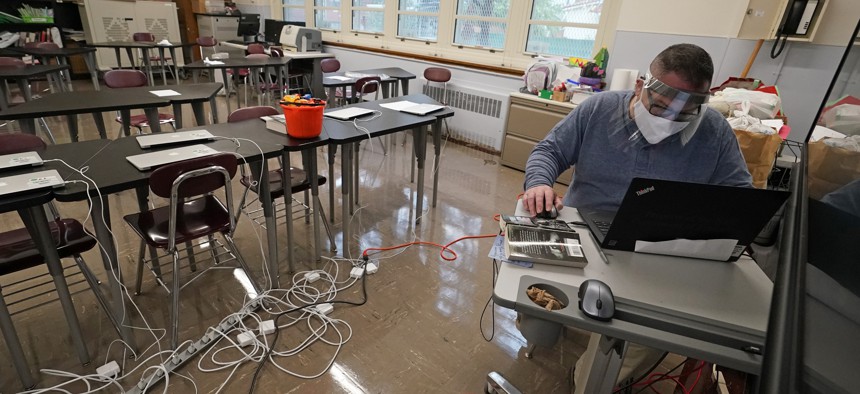Ski Patrol Before Teachers? States Criticized Over Vaccine Timelines

English lauguage arts teacher Frank Esposito works on his laptop in his classroom at West Brooklyn Community High School, Thursday, Oct. 29, 2020, in New York. AP Photo/Kathy Willens
State officials chose which groups are next in line for coronavirus vaccines. Now some are facing criticism over who they prioritized.
As states begin to make coronavirus vaccines available to broader segments of the public, health officials have had to make difficult choices about who should be next in line.
And state leaders are facing pushback over determinations that certain occupations or medical conditions will be eligible before others.
New Jersey Gov. Phil Murphy recently defended his state’s decision to include smokers in the latest category of people eligible for the vaccine after criticism from educators, who will not be eligible until a later vaccination phase.
“I must push back on the false narrative that we’re vaccinating smokers while not vaccinating another group,” Murphy wrote on Twitter, emphasizing that the state has a duty to prioritize those who are at a higher risk. “We have a limited supply of vaccines from the federal government – roughly 100,000 additional doses coming in per week.”
Last week, the state opened up vaccine eligibility to residents 65 and older and those between the ages of 16 and 64 who have chronic medical conditions. Smokers were included because of their susceptibility to the virus, said Health Commissioner Judy Persichilli.
While the U.S. Centers for Disease Control and Prevention’s Advisory Committee on Immunization Practices issued guidance on which groups to prioritize for each phase of the vaccine rollout, states have leeway to adjust or ignore those recommendations. But as states chose to deviate from the CDC guidance, leaders have been put in the hot seat by professional organizations advocating for their members.
Meatpackers, aviation workers, and firefighters are among those who have lobbied lawmakers to include their industries in early vaccine distribution phases.
Decisions that have placed teachers behind other occupational groups have also been a source of tension for state officials. Vaccination of teachers will be key to reopening schools—something President Biden has promised to make significant progress on during his first 100 days in office.
The New Hampshire chapter of the National Education Association was furious that members of the ski patrol qualified for the first phase of vaccinations ahead of teachers.
The organization issued a statement this month asking Gov. Chris Sununu to explain why ski patrol members were included in “Phase 1a” while educators will have to wait until “Phase 2” begins in March. New Hampshire is one of only a few states that have not followed CDC guidance to include teachers in “Phase 1b.”
“We’re upset because we believe front line educators need to be vaccinated before out-of-state ski patrol members. And so does every other state in the union,” the association wrote.
Sununu accused the association of politicizing the vaccination process and noted that some schools have reopened for hybrid or in-person learning even before the vaccine was available.
“This idea that you have to prioritize teachers because they have to have the vaccine to open a school, that's a completely false statement, and it's proven out hundreds of times over across the state,” Sununu said at a press conference this week.
Vaccine scarcity may lead some states to progress more slowly through their distribution phases than others, punting potentially divisive eligibility questions down the road for months.
Major cities in California have opened multiple large-scale vaccine sites, but state officials said this week that vaccine stocks are critically low due to supply issues. The state is currently vaccinating people age 65 and older, healthcare industry workers and employees and residents of nursing homes. But many have reported difficulties getting appointments or endured long lines to get their shots.
State officials said this week that based on the current pace of vaccine shipments from the federal government, it could take four months to finish vaccinating all people over the age of 65 and to move onto the next phase.
In Washington, D.C., local officials plan to make people with a broad swath of preexisting health conditions, including obesity, eligible for priority vaccination. Some public health experts have questioned whether the District will be able to keep up with demand if it extends eligibility too far too soon.
Andrea Noble is a staff correspondent with Route Fifty.
NEXT STORY: How Biden Plans to Beat Republican Obstructionism





